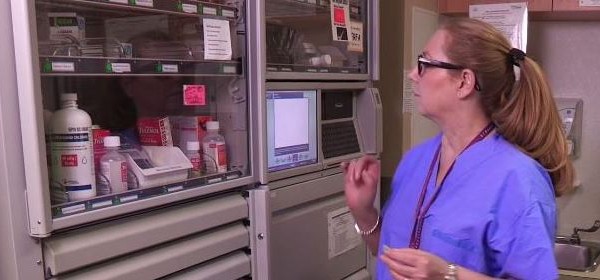One step closer to reducing adverse medication events – Part two
With the rollout of Omnicell automated dispensing cabinets, VCH, PHSA and PHC are taking a major step towards ensuring the right patient gets the right medication at the right time.
“The biggest advantage of Omnicell cabinets is that they help to increase medication safety, which improves the quality of care for patients,” says Sheila Shayesteh, Lions Gate Omnicell Project Manager.
The cabinets are an integral part of the Clinical and Systems Transformation (CST) project’s closed loop medication management process, which electronically connects the entire journey from the point where an order is entered all the way to administration of medication at the patient’s bedside.
The Omnicell cabinets are linked with the pharmacy information system, which enables pharmacist review of a prescription before the medication is removed from the cabinet. When a medication is selected, the nurse will be directed to a specific drawer and bin to ensure the right medication is selected.
Omnicells also improve efficiency. Nurses don’t need to rely on manual checking of medication stocked on their unit or call down to pharmacy when they are running low. The cabinets send inventory reports to pharmacy for automatic restocking, including tracking expiry dates. They also record and track narcotics and controlled drugs so nurses can spend less time counting and more time providing patient care.
“The Omnicell cabinet prompts you to provide an additional med check with the onscreen instructions,” says Ben Nehra, Medicine Clinical Nurse Leader at St. Paul’s Hospital. Ben also points to significant time savings in narcotic administration and the weekly med count, and says that having two cabinets per unit has meant that lineups for medications are rare. “In short, the staff have been happy to incorporate Omnicell into their nursing practice.”
The initial transition to the new technology has its challenges – not the least of which are new workflows that pharmacy and nursing staff have to navigate. The pharmacy team at Lions Gate Hospital worked with a LEAN management advisor to develop new workflows and schedules to accommodate the increased number of cabinets. At Lions Gate, 10 per cent of the nursing staff was trained as “super users.”
“While there were some initial fears about moving to a different system, the education, roll-out and support quelled concerns and allowed us to make the transition with minimal issues,” says Ben.
The last of the Lions Gate cabinets were implemented on June 21 – a milestone on the path to our clinical transformation.
“These cabinets are a necessity to support safe medication practices. After using them for a few weeks, our staff never want to go back to the old state,” says Sheila.
Related reading
- From apprehensive to ‘spoiled’ – ICU RN grateful and thankful for Omnicell cabinets
- One step closer to reducing adverse medication events (Part one of a two-part series)

